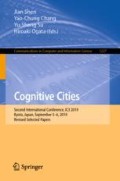Abstract
With this study, we aim to explore the learning analytics framework that was based on the learning theory and combine data mining approaches. It is expected to explore the spontaneous learning behavior and cognitive process of the concept of geometric area during the learning process and present interesting results. This pilot study recruited 160 11-year-old children in Grade 5 of elementary schools in urban and rural areas of Taiwan. The simulation-based environment embedded four instructional designs to support students learning geometric area, which we named the simulation-based assist area concept learning environment (SAACLE). According to the statistical analyses, we found the pilot results showed that the indigenous children seemed to outperform the nonindigenous children in highly directed learning environments; in contrast, the urban children outperformed the indigenous children in learning environments with little direction. Interestingly, such a performance did not exist during the learning processes, and the indigenous and nonindigenous children demonstrated different learning patterns in retention- and transfer-level posttests. Furthermore, we explored the learning analytics framework to analyze the leaning process log file and clarify the learning patterns of children with different sociocultural backgrounds.
Access this chapter
Tax calculation will be finalised at checkout
Purchases are for personal use only
References
Angeli, C., Howard, S.K., Ma, J., Yang, J., Kirschner, P.A.: Data mining in educational technology classroom research: can it make a contribution? Comput. Educ. 113, 226–242 (2017)
Azevedo, R.: Understanding the complex nature of self-regulatory processes in learning with computer-based learning environments: an introduction. Metacognition Learn. 2, 57–65 (2007)
Chen, Y.L., Pan, P.R., Sung, Y.T., Chang, K.E.: Correcting misconceptions on electronics: effects of a simulation-based learning environment backed by a conceptual change model. Educ. Technol. Soc. 16(2), 212–227 (2013)
Chi, M.T., Wylie, R.: The ICAP framework: linking cognitive engagement to active learning outcomes. Educ. Psychol. 49(4), 219–243 (2014)
Chi, M.T., et al.: Translating the ICAP theory of cognitive engagement into practice. Cogn. Sci. 42(6), 1777–1832 (2018)
De Jong, T., Van Joolingen, W.R.: Scientific discovery learning with computer simulations of conceptual domains. Rev. Educ. Res. 68(2), 179–201 (1998)
Gašević, D., Kovanović, V., Joksimović, S.: Piecing the learning analytics puzzle: a consolidated model of a field of research and practice. Learn. Res. Pract. 3(1), 63–78 (2017)
Gašević, D., Mirriahi, N., Dawson, S., Joksimović, S.: Effects of instructional conditions and experience on the adoption of a learning tool. Comput. Hum. Behav. 67, 207–220 (2017)
Geng, L., Hamilton, H.J.: Interestingness measures for data mining: a survey. ACM Comput. Surv. (CSUR) 38(3), 9 (2006)
Hadwin, A.F., Nesbit, J.C., Jamieson-Noel, D., Code, J., Winne, P.H.: Examining trace data to explore self-regulated learning. Metacognition Learn. 2, 107–124 (2007)
Landriscina, F.: Simulation and Learning: A Model-Centered Approach. Springer, New York (2013). https://doi.org/10.1007/978-1-4614-1954-9
Mahzoon, M.J., Maher, M.L., Eltayeby, O., Dou, W., Grace, K.: A framework for interactive exploratory learning analytics. In: Zaphiris, P., Ioannou, A. (eds.) LCT 2018. LNCS, vol. 10925, pp. 319–331. Springer, Cham (2018). https://doi.org/10.1007/978-3-319-91152-6_25
Mangaroska, K., Giannakos, M.N.: Learning analytics for learning design: A systematic literature review of analytics-driven design to enhance learning. IEEE Trans. Learn. Technol. 12(4), 518–531 (2018)
Mayer, R.E.: Cognitive theory of multimedia learning. In: Mayer, R.E. (ed.) The Cambridge handbook of multimedia learning, pp. 43–71. Cambridge University, New York (2014)
McGarry, K.: A survey of interestingness measures for knowledge discovery. Knowl. Eng. Rev. 20(1), 39–61 (2005)
Papamitsiou, Z., Economides, A.A.: Learning analytics and educational data mining in practice: a systematic literature review of empirical evidence. J. Educ. Technol. Soc. 17(4), 49–64 (2014)
Rodrigues, M.W., Isotani, S., Zarate, L.E.: Educational data mining: a review of evaluation process in the e-learning. Telematics Inform. 35(6), 1701–1717 (2018)
Rutten, N., van Joolingen, W.R., van der Veen, J.T.: The learning effects of computer simulations in science education. Comput. Educ. 58(1), 136–153 (2012)
Slater, S., Joksimović, S., Kovanovic, V., Baker, R.S., Gasevic, D.: Tools for educational data mining: a review. J. Educ. Behav. Stat. 42(1), 85–106 (2017)
Veenman, M.V.J.: The assessment and instruction of self-regulation in computer-based environments: a discussion. Metacognition Learn. 2, 177–183 (2007)
Winne, P.H.: Leveraging big data to help each learner upgrade learning and accelerate learning science. Teachers Coll. Rec. 119(3), 1–24 (2017)
Author information
Authors and Affiliations
Corresponding author
Editor information
Editors and Affiliations
Rights and permissions
Copyright information
© 2020 Springer Nature Singapore Pte Ltd.
About this paper
Cite this paper
Hsu, Y., Hsu, SK. (2020). A Pilot Study of the Effects of Instructional Design with Learning Analytics on a Computer Simulation-Based Learning Environment. In: Shen, J., Chang, YC., Su, YS., Ogata, H. (eds) Cognitive Cities. IC3 2019. Communications in Computer and Information Science, vol 1227. Springer, Singapore. https://doi.org/10.1007/978-981-15-6113-9_32
Download citation
DOI: https://doi.org/10.1007/978-981-15-6113-9_32
Published:
Publisher Name: Springer, Singapore
Print ISBN: 978-981-15-6112-2
Online ISBN: 978-981-15-6113-9
eBook Packages: Computer ScienceComputer Science (R0)

